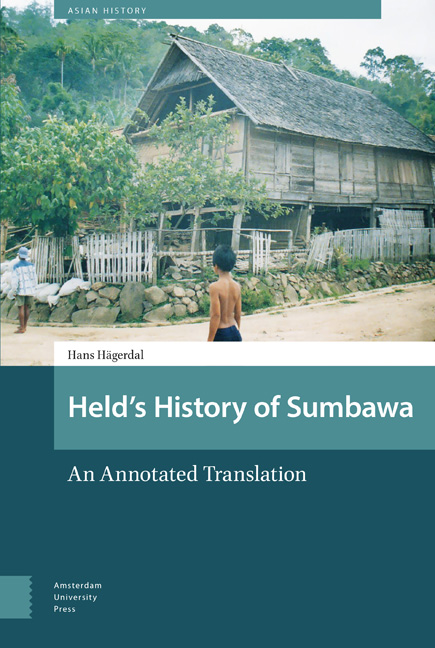Book contents
- Frontmatter
- Contents
- List of Figures and Tables
- Map
- Translator’s Introduction
- 1 The Ancient Period
- 2 Islam and Makassar
- 3 The Sumbawan Kingdoms under VOC Suzerainty (1)
- 4 The Sumbawan Kingdoms under VOC Suzerainty (2)
- 5 In the Wake of the Tambora Disaster
- 6 From Colonial rule to Independence
- Appendix: Lists of Sumbawan Rulers
- Bibliograph
- Index
6 - From Colonial rule to Independence
Published online by Cambridge University Press: 10 December 2020
- Frontmatter
- Contents
- List of Figures and Tables
- Map
- Translator’s Introduction
- 1 The Ancient Period
- 2 Islam and Makassar
- 3 The Sumbawan Kingdoms under VOC Suzerainty (1)
- 4 The Sumbawan Kingdoms under VOC Suzerainty (2)
- 5 In the Wake of the Tambora Disaster
- 6 From Colonial rule to Independence
- Appendix: Lists of Sumbawan Rulers
- Bibliograph
- Index
Summary
[Conserving Dutch influences]
There is still a group of actors which we have still not brought to the scene, namely the Dutch. It is self-evident that the influence of this group is mainly determined by circumstances outside of the Island of Sumbawa, which was only of subordinate importance as a trade centre. For the history I refer to existing history books where the course that history has taken outside of Sumbawa is described. One can generally posit that the Dutch did not have any significant direct influence on Pulau Sumbawa during almost their entire period as a power in Indonesia. After 1667, one may say, the Company was locked in a wrestling contest with Gowa, from which both parties were unable to break loose for centuries. The cultural life of Sumbawa was no longer moved by the waves of the cultural life in outside centres, such as Java, Ternate and South Celebes. Even the active policy of the Netherlands Indies government after 1910 could not bring about any far-reaching changes in Sumbawa. There were more urgent matters to regulate in other regions than on this island, where centuries-old forms of organization had determined the regulation of internal concerns. And before the Netherlands Indies government found time to intervene forcefully in the affairs of Sumbawa, the Second World War stood at the door, which also lead to far-reaching consequences in Sumbawa.1 In regards to my remarks below on the changes and constitutional circumstances between the territory [landschap] and the central government, we must realize that a deeper knowledge of law is necessary for such an investigation, which I do not possess.
The most significant remark that I make in this connection is a reference to Professor G.J. Resink, who asserted in 1939 that the relations with the kingdoms, until recently, can be regarded as belonging to the sphere of international law. It was only in 1905 that the territory became an administrative part of the Netherlands Indies, and it is only then that one may speak of a relation between the central government and the territory, as a whole and a part.
- Type
- Chapter
- Information
- Held's History of SumbawaAn Annotated Translation, pp. 171 - 192Publisher: Amsterdam University PressPrint publication year: 2017



